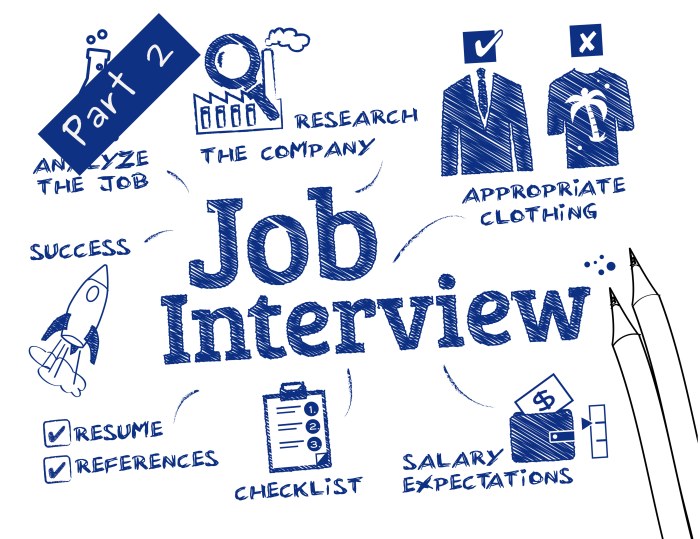Job Interview Preparation is key to landing your dream job. From nailing common interview questions to dressing the part, this guide will help you stand out in the competitive job market with some serious street cred.
Get ready to level up your interview game and leave a lasting impression on potential employers.
Importance of Job Interview Preparation
Job interview preparation is crucial for ensuring success in securing a desired position. It allows candidates to showcase their qualifications, skills, and personality effectively, giving them a competitive edge over other applicants.
Enhances Confidence
Proper preparation boosts confidence levels, enabling candidates to present themselves in a composed and professional manner during the interview.
Demonstrates Interest
Thorough preparation demonstrates to the interviewer that the candidate is genuinely interested in the position and the company, leaving a positive impression.
Improves Performance
Being well-prepared allows candidates to answer questions articulately, provide relevant examples, and ask insightful questions, showcasing their qualifications effectively.
Researching the Company

Researching the company before a job interview is crucial to show your interest and preparation. It allows you to understand the company’s values, goals, and culture, helping you tailor your responses to align with what they are looking for in a candidate.
Significance of Researching the Company
- It demonstrates your genuine interest in the position and company.
- It helps you understand the company’s products, services, and industry.
- It allows you to prepare questions to ask during the interview.
Tailoring Responses During the Interview
- By knowing the company’s values and goals, you can align your answers to showcase how you can contribute to their success.
- Understanding the company culture can help you emphasize your skills and experiences that fit well within their work environment.
What to Look for When Researching a Company
- Company mission and values to align your responses with their objectives.
- Recent news or press releases to stay updated on their latest achievements or challenges.
- Products or services offered to understand their business model and target market.
- Company culture and employee reviews to gauge the work environment and see if it aligns with your preferences.
Understanding Common Interview Questions
When preparing for a job interview, it is essential to anticipate and prepare for common interview questions that may be asked. This will help you feel more confident and articulate during the interview.
Identifying Common Interview Questions
Common interview questions that candidates should be prepared to answer include:
- “Tell me about yourself”: This question allows the interviewer to get to know you and your background.
- “What are your strengths and weaknesses?”: Be ready to discuss your strengths and weaknesses honestly and professionally.
- “Why do you want to work for our company?”: Research the company beforehand and tailor your response to show your interest in the organization.
- “Can you provide an example of a time when you resolved a conflict?”: Be prepared to share a specific example of how you handled a challenging situation.
Strategies for Answering Behavioral and Situational Questions
Behavioral and situational interview questions are designed to assess how you would handle specific scenarios. Strategies for effectively answering these questions include:
- Use the STAR method (Situation, Task, Action, Result) to structure your responses.
- Provide specific examples from your past experiences to demonstrate your skills and abilities.
- Be concise and to the point when answering these types of questions.
Importance of Practicing Responses
Practicing responses to common interview questions is crucial for several reasons:
- It helps you articulate your thoughts clearly and confidently during the interview.
- Practicing responses can help you refine your answers and tailor them to highlight your qualifications.
- By rehearsing your responses, you can also identify areas where you may need to provide more detailed examples or explanations.
Dressing Appropriately for the Interview

Dressing professionally for a job interview is crucial as it shows respect for the opportunity and demonstrates your commitment to the role. Your outfit can speak volumes about your personality and attention to detail. First impressions are lasting, and dressing appropriately can set the tone for a positive interaction.
Choosing the Right Attire
- Research the company culture: Consider the industry and company norms when selecting your outfit. For a more conservative field, such as finance or law, opt for a traditional suit. In creative industries, you may have more flexibility to showcase your personal style.
- Fit is key: Ensure your clothes fit well and are comfortable. Avoid anything too tight or too loose, as it can be distracting during the interview.
- Avoid loud colors and patterns: Stick to neutral colors like black, navy, grey, or white. Subtle patterns are acceptable, but flashy prints or bright colors can be off-putting.
- Pay attention to details: Iron your clothes, polish your shoes, and make sure your accessories are understated. Small details can make a big difference.
First Impressions Matter, Job Interview Preparation
First impressions are formed within the first few seconds of meeting someone, and your appearance plays a significant role in this process. A well-groomed, professional appearance can instill confidence in the interviewer and convey that you take the opportunity seriously.
Practicing Interview Etiquette
In the job interview process, practicing good interview etiquette is crucial for leaving a positive impression on the interviewer and increasing your chances of landing the job.
Proper interview etiquette includes simple yet impactful actions that show respect and professionalism. By demonstrating good etiquette, you can showcase your reliability, communication skills, and overall suitability for the position.
Arriving on Time
- Arriving on time for the interview is essential to show that you are punctual and respectful of the interviewer’s time.
- Plan your route in advance and aim to arrive at least 10-15 minutes early to account for any unexpected delays.
Maintaining Eye Contact
- Maintaining eye contact during the interview demonstrates confidence and attentiveness.
- It shows that you are engaged in the conversation and interested in the opportunity.
Positive Influence on Interviewer’s Perception
- Displaying good etiquette can positively influence the interviewer’s perception of you as a candidate.
- It can help build rapport and establish a connection with the interviewer, making you more memorable.
